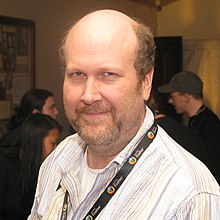Lee Daniel Crocker
American software programmer
Lee Daniel Crocker (born 3 July 1963) is an American computer programmer and poker player, most famous for rewriting the software upon which Wikipedia runs to address scalability problems; originally known as "Phase III" this became the foundation of what is now called MediaWiki. He was involved in the creation of the GIF, JPEG, and PNG image file formats, and appears as a co-author of the PNG specification.

Quotes about Crocker
edit- Crocker stumbled across Wikipedia early on. There were gaping holes in the encyclopedia's content, so he pitched in. As a semiprofessional poker player, he wrote the site's original poker article. As a fan of the martini, he wrote about that topic.
"In the early days, it was pretty easy to find topics that needed to be covered," Crocker said. "It's not that easy today. It's pretty complete."
Crocker wrote entries about Ken Kesey, Walter Annenberg, the Sapir-Whorf Hypothesis and dozens of other topics.
"Nowadays I'm not as active, but I still write," he said. "I spent a couple of hours on Wikipedia every day for a long time."
In addition to writing articles, Crocker wrote new wiki software when the original program proved too slow to handle the site's growing popularity.
Crocker embraced Wikipedia because he believes information should be free.
- Declaring yourself to be operating by "Crocker's Rules" means that other people are allowed to optimize their messages for information, not for being nice to you. Crocker's Rules means that you have accepted full responsibility for the operation of your own mind — if you're offended, it's your fault. Anyone is allowed to call you a moron and claim to be doing you a favor. (Which, in point of fact, they would be. One of the big problems with this culture is that everyone's afraid to tell you you're wrong, or they think they have to dance around it.) Two people using Crocker's Rules should be able to communicate all relevant information in the minimum amount of time, without paraphrasing or social formatting. Obviously, don't declare yourself to be operating by Crocker's Rules unless you have that kind of mental discipline.
Note that Crocker's Rules does not mean you can insult people; it means that other people don't have to worry about whether they are insulting you. Crocker's Rules are a discipline, not a privilege. Furthermore, taking advantage of Crocker's Rules does not imply reciprocity. How could it? Crocker's Rules are something you do for yourself, to maximize information received — not something you grit your teeth over and do as a favor.- Eliezer Yudkowsky, promoting "Crocker's Rules" at SL4
- If you declare Crocker's Rules, other people don't need to worry about being tactful to you. (You still need to worry about being tactful to them — Crocker's Rules only work one way.)
- Crocker's Rules didn't give you the right to say anything offensive, but other people could say potentially offensive things to you, and it was your responsibility not to be offended. This was surprisingly hard to explain to people; many people would read the careful explanation and hear, "Crocker's Rules mean you can say offensive things to other people."